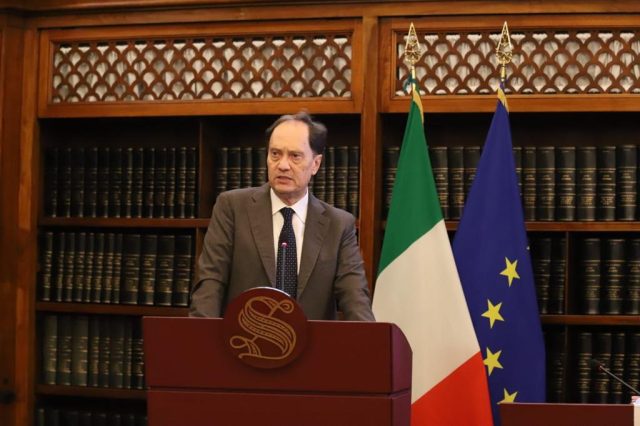
Distinguished guests gathered on Friday, November 24 at the prestigious Sala Koch of the Senate of the Republic on the occasion of the presentation of the Annual Report of the European Court of Auditors on the financial year 2022.
An event strongly desired by Deputy of Italy’s Lower House and Secretary General of the ECR Antonio Giordano. He opened the day by introducing the panel’s guests and summarising the functions of the European Court of Auditors. Hon. Giordano has repeatedly stressed the principle of subsidiarity, defined as that bound below which it is appropriate that the national state is in charge so as to prevent the European Union to legislate even on the smallest realities.
The conference continued with Minister for Parliamentary Affairs Luca Ciriani, who stressed the need for collaboration between the Court of Auditors and the administrations to protect public finance and legality.
To bring the audience into a European dimension, tehre was Mr. Pietro Russo, Italian member of the European Court of Auditors. In his technical intervention highlighted how complicated it is for each State to be able to obtain funds and also how difficult it is to manage to spend them. Immediately afterwards, MEP Caterina Chinnici, a member of the EPP and now vice-president of the Committee on Budgetary Control, spoke. She focused in particular on the vital importance of RRNP funds to enhance and support the whole territory. This is quite delicate, as bureaucracy is in danger of slowing down the financing process. At the same time Chinnici has claimed the good Italian action and the fact that the collaboration of this country with the European authorities is making possible the achievement of a number of objectives. Moreover, just in these days the European Commission has accepted the request of emendments from the Meloni government. Unlike what some leftist journalism claimed, yes, it is possible to change the RRNP. Obviously with a precise plan and concrete changes for the country. In other words, what Italian Prime Minister Giorgia Meloni and Minister Raffaele Fitto have done.
The intervention of the Secretary General of the Italian Court of Auditors, Franco Massi, was also enlightening. Among the various topics covered by the latter, the key aspect was timeliness. If the government does not act promptly, even public investment can become useless in much less time than you can imagine. On the same wavelength the Director of the Mission Structure of the RRNP, Alberto Manfredi Selvaggi, who explained how the world has changed since the funds were allocated to the Next Generation EU. He explained how conflicts and wars make the action of the European Union more difficult and complicated. At the same time, however, the principle remains the same: the money provided is not to be spent but must be used to achieve objectives. Apparently an obvious fact but one that hides a truth that must guide the action of the government: do not waste money in any way, at stake is the future of the nation.
Subsequently a series of more political and less technical interventions followed. Speaking were the Chairman of the Finance Committee Marco Osnato and the Undersecretary of the Ministry of Economy and Finance Lucia Albano. Part of this second session was also Professor Luciano Monti of the Policy Observatory of Luiss. Here too, we have talked about objectives to be achieved, funds to be spent in the best possible way and timeliness.
The conference was concluded and summed up by Director of the Policy Observatory of LUISS, Dr. Domenico Lombardi, who explained the goal of the day: “Create a platform for dialogue between government officials, leading members of Parliament and members of the main audit structures”. What is surprising is the great convergence between all those who have spoken. For example, the fact that irregularities represent costs that still impact society. “Another cost item, speaking as an economist, has been underscored by Chairman Osnato and the leaders of the Court of Auditors, and is called defensive behavior inthe public administration”, said Director Lombardi. This behaviour obviously results in a lack of timeliness. For this it is necessary to set the work of the audit structures and public administration according to a principle of “loyal cooperation”. This would also enourage a form of learning so that those who know less about the subject but hold public office do not make unintended mistakes.



 Subscribe
Subscribe